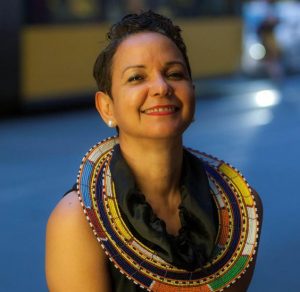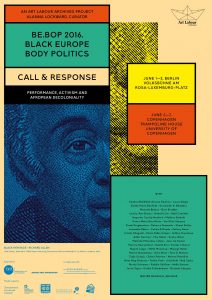 Alanna Lockward (1961-2019) was a theorist, novelist, curator and documentary filmmaker. She was born in Santo Domingo in 1961, attended the Metropolitan Autonomous University in the early 1980s, and by 1988 was appointed Director of International Affairs at the Museo de Arte Moderno de Santo Domingo. In the latter part of her life, Lockward split her time between Germany and Santo Domingo. Fluent in Spanish, German and English, Lockward received a Masters degree from the Berlin University of the Arts and, less than one month before her untimely death, defended her PhD on “The Black Church in the War Zone: A Decolonial Reading of Richard Allen’s ‘Other’ Black Atlantic” at the English and American Studies Department at Humboldt University in Berlin.
Alanna Lockward (1961-2019) was a theorist, novelist, curator and documentary filmmaker. She was born in Santo Domingo in 1961, attended the Metropolitan Autonomous University in the early 1980s, and by 1988 was appointed Director of International Affairs at the Museo de Arte Moderno de Santo Domingo. In the latter part of her life, Lockward split her time between Germany and Santo Domingo. Fluent in Spanish, German and English, Lockward received a Masters degree from the Berlin University of the Arts and, less than one month before her untimely death, defended her PhD on “The Black Church in the War Zone: A Decolonial Reading of Richard Allen’s ‘Other’ Black Atlantic” at the English and American Studies Department at Humboldt University in Berlin.
Lockward hailed from a well-known Santo Domingo artistic/academic family, and it is fair to say that her major accomplishments reflect this heritage, many of which she pursued through her Art Labour Archives agency. In 2012, Lockward curated the first of a set of meetings entitled “Be.Bop. Black Europe Body Politics”, held variously in Berlin, Copenhagen, Amsterdam, and London. Following the 2018 Be.Bop, Lockward had planned to hold the subsequent gathering in Haiti.
Lockward described Be.Bop as an “international screening program and transdisciplinary roundtable centered on Black European citizenship in connection to recent moving image and performative practices”. With Walter Mignolo as advisor, Lockward’s curation of a set of artists and intellectuals from the Caribbean, South and North America, Europe and Africa, made a significant intervention into the cultural politics of Black Europe – or “Afropean” world. Above all, Be.Bop provided a forum wherein Blackness could be critically apprehended from decolonial, pan-African and pluri-geographical perspectives. Be.Bop exemplified – and helped to advance – the project of “decolonial aesthesis”, which Mignolo and Rolando Vazquez gloss as an attempt “to decolonize the regulation of sensing all the sensations to which our bodies respond, from culture as well as from nature.”
Lockward described her own commitments in terms of an “Afropean Decolonial Aesthetics” for which she undertook a sympathetic yet subtle critique of the famous cultural theorist, Stuart Hall. Reflecting on his life as a migrant to Britain from Jamaica, Hall commented ironically on the exuberance of those who welcomed a “postmodern age”:
Now … you all feel so dispersed, I become centered. What I’ve thought of as dispersed and fragmented comes, paradoxically, to be the representative modern experience! This is “coming home” with a vengeance.
Lockward took issue with the site upon which Hall envisaged this return – a predominantly white, Western, metropolitan location. Instead, she sought to thread artistic cultivation in this location through the colonial sites of the Caribbean and elsewhere – sites wherein such cultivation had never stopped:
From the decolonial perspective, we have never abandoned “home” (coloniality). The process of decolonization of our minds involves a realization of this fact. We have always been here as the hidden side of modernity, therefore our presence is self-explanatory.
In this respect, Lockward critiqued the way in which the cultivation of theory was so often positioned within the “art plantations of modernity”. Alternatively, Lockward apprehended theory as something that exceeded the textual, flowing between art forms and media, being shaped in this movement, and binding peoples and their expressions across what Erna Brodber (a Jamaican novelist influential to Lockward) called the “continent of Black consciousness”. Yet Lockward was incredibly attuned to the power inequalities that inevitably accompanied any politics of solidarity, especially the availability of resources that particular participants to Be.Bop might be able to call upon. For this reason, Lockward always felt that her principle responsibility was towards the support and development of Black artists based in Europe. Jeannette Ehlers, one such visual artist, comments upon her own experience of Be.Bop thus:
Alanna invited me to take part in the first Berlin edition of BEBOP in 2012. I was left totally disoriented and flabbergasted by the ways, in which issues of black existence in Europe were discussed, something I had never experienced before. Growing up with the Scandinavian colonial amnesia, equipped with a poor vocabulary around these matters, I had a hard time following the academic practices performed at BEBOP. The bar was incredibly high, but at the same time, I instantly felt the significance of this project, especially due to its embrace of artistic practices. Moreover, the feeling of belonging overwhelmed me. So did the love and strong connectivity among the “BEBOPEANS”, who later became like a second Family to me. I was intrigued by the spirituality that surrounded BEBOP, and by the dedication and determination to challenge the plantation system’s continuing influence on our societies. With BEBOP, Alanna created a space for sacred knowledge production; a space for decolonial love, passion and poesy and for the painful healing of the colonial wounds, a combination rarely seen in the Western art world.
 Lockward’s last project before her passing was in many ways closest to her heart in so far as it continued the work of her grand-father George Augustus Lockward Stamers who had previously tracked the influence of the Protestant church in Hispaniola in the aftermath of the Haitian Revolution. Based on her PhD thesis, Lockward’s documentary The Allen Report traces the “liberation legacy” of the African Methodist Episcopal Church (AME) across North America, the Caribbean and Southern Africa. Lockward situates Richard Allen, founder of the AME church in Philadelphia, within a Black Atlantic world wherein – and unlike the secular narrative of Paul Gilroy – spiritual connectivities fundamentally comprise the struggle against enslavement and apartheid.
Lockward’s last project before her passing was in many ways closest to her heart in so far as it continued the work of her grand-father George Augustus Lockward Stamers who had previously tracked the influence of the Protestant church in Hispaniola in the aftermath of the Haitian Revolution. Based on her PhD thesis, Lockward’s documentary The Allen Report traces the “liberation legacy” of the African Methodist Episcopal Church (AME) across North America, the Caribbean and Southern Africa. Lockward situates Richard Allen, founder of the AME church in Philadelphia, within a Black Atlantic world wherein – and unlike the secular narrative of Paul Gilroy – spiritual connectivities fundamentally comprise the struggle against enslavement and apartheid.
In pursuing this investigation, Lockward was also driven by a long-standing concern to provide materials with which to heal the racist wounds that certain elites had utilized in the 20th century to separate the island of Hispaniola into a Black Haiti and an anti-black Dominican Republic. Centering the Haitian revolution in her own personal, intellectual and spiritual genealogy was fundamental to Lockward’s pan-Africanism, a commitment that she never failed to identify in the legacy of Marcus Garvey by affirming her own Blackness without hesitation. Tellingly, for this task of island redemption, Lockward utilized a healing framework provided by Haitian Vodou, wherein Hispaniola is presented in terms of Marassá – the loa (agent) that represents twins and duality-in-one.
In summary, Lockward’s abiding contribution is to unsettle colonially-induced binaries and to identify healing processes for the retrieval of a decolonized humanity by weaving together art and theory, the spiritual and aesthetic, and Blackness across continents.
Readings:
Alanna Lockward, “Black Europe Body Politics: Towards an Afropean Decolonial Aesthetics“, Social Text: Periscope, 2013 /
Alanna Lockward, “Blesi Doub. Heridas Dobles. Dual Wounds. Re-writing the Island“, in O. Rutazibwa & R. Shilliam (eds.), The Routledge Handbook of Postcolonial Politics (London: Routledge, 2018)
Online resources:
The Decolonial AestheSis dossier
Art Labour Archives
Be.Bop 2012: Black Europe Body Politics
Be.Bop 2013: Decolonizing the ‘Cold’ War
Be.Bop 2014: Spiritual Revolutions & ‘The Scramble for Afrika’
Be.Bop 2016: Call & Response: Performance, Activism and Afropean Decoloniality
Be.Bop 2018: Coalitions facing White Innocence
Questions:
From a decolonial perspective, what is the relationship between theory and art?
In a world of coloniality, what might be the ties that bind the Black Diaspora?
Submitted by Jeannette Ehlers and Robbie Shilliam